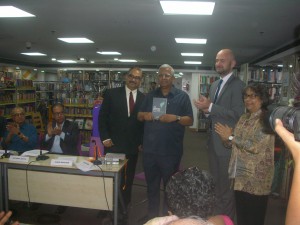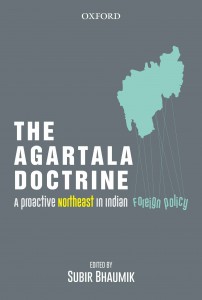When Tripura governor Tathagata Ray referred to the Gujral doctrine as the ‘Gujral-Vajpayee’ doctrine during a book launch, he was perhaps making a not-so-subtle suggestion of his lack of faith in unilateralism in foreign policy.
Launching veteran journalist-author Subir Bhaumik’s “Agartala Doctrine” at British Council in Calcutta (Kolkata), Ray batted for the ‘Agartala doctrine of reciprocal appropriate response’ — hit out when attacked, but walk an extra mile if neighbors want to be friends.

“Agartala Doctrine” launching event in Kolkata Photo: LOOKEAST INDIA
The book is based on how leaders of Tripura, from its first chief minister Sachindralal Singha to current chief minister Manik Sarkar, have pursued a proactive policy of engagement in the neighborhood. Singha for backing the Bengali movement in East Pakistan much before Delhi intervened, Sarkar for launching covert trans-border strikes on separatist bases in Bangladesh using surrendered militants and Bangladesh mafia but now fervently developing close connectivity with Bangladesh under Sheikh Hasina.
But the author has never described, either in his book or speech, the Gujral doctrine as ‘Gujral-Vajpayee doctrine’ — so governor Ray, a veteran BJP leader from West Bengal, was linking Vajpayee to Gujral’s unilateralism in clear disapproval.
“The Agartala doctrine developed on the basis of Tripura’s role in the neighborhood is worth consideration as a national doctrine for handling the neighborhood. The author rightly says India neither needs US Monroe doctrine and surely not Gujral doctrine of unilateral magnanimity,” Tathagata Ray said, while launching the book flanked by British Deputy High Commissioner Scott Furseddom-Wood and British Council regional director Sujata Sen.
Author Subir Bhaumik said Tripura chief minister Manik Sarkar’s recent praise for former Home Minister L K Advani indicates he had his approval for covert operations inside Bangladesh, though Vajpayee and his National Security Advisor Brajesh Mishra were clearly opposed to it.
Agartala Doctrine is more than tit–for-tat. It is not just about hitting back at recalcitrant neighbours but also walking the extra mile when they want to be friends
The book refers to 21 such strikes on rebel bases and hideouts between 2001-2004 using surrendered militants and Bangladesh mafia that, Bhaumik says, broke the back of separatist insurgency in Tripura.
“The country went ga-ga over one such strike in Myanmar last year, but Sarkar prefers total secrecy and no chest-thumping, he is interested in results,” Bhaumik said.

Credit: Oxford University Press
Joining the panel discussion, National Professor Jayanta Kumar Ray endorsed the Agartala doctrine and called upon the Modi-Doval administration to seriously consider the tough-and-sweet Tripura approach for dealing with the neighborhood.
“The book also has much historical value, it has enviable documentation and throws light on many unknown facts,” Prof Ray, former director of Maulana Azad Institute of Asian Studies (MAKAIS) said.
Former Intelligence Bureau chief and Nagaland Governor Shyamal Datta reminded the audience that it would be unfair to give the whole credit to chief minister Manik Sarkar for crushing the insurgency in Tripura.
“The covert operations were cleared by Delhi, there is no way a state could take such action without knowledge of the Centre,” Datta said.
He reminded the audience of the Doval doctrine of ‘tit-for-tat’ (strike Balochistan for Mumbai), the spirit of which runs akin to the Agartala doctrine of appropriate response.
“But Agartala doctrine is more than tit–for-tat. It is not just about hitting back at recalcitrant neighbours but also walking the extra mile when they want to be friends,” said author Subir Bhaumik, reminding the audience that his suggested doctrine was ‘dynamic and flexible’ as it was based on reciprocity.
Former foreign secretary Krishnan Srinivasan said he never reposed much faith in doctrines because they restricted flexibility and freedom of action.
“But I like the approach suggested by the book. It is interesting,” he said, stressing its greater role of diplomacy rather than wars in handling the neighborhood.
Lt Gen J Mukherjee, former Eastern Command chief of staff, endorsed the ‘Agartala doctrine’ and said it promises to end the policy confusion in Delhi.













